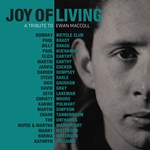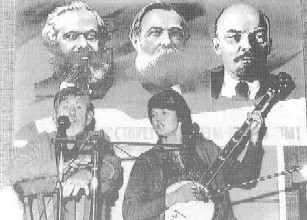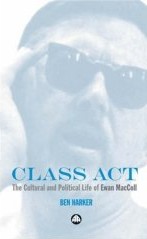
Ewan MacColl's 100th birthday has been celebrated with a tribute concert at London's The Barbican and a double album of some of Ewan MacColl’s finest songs recorded by a host of well-known artists.

James Henry Miller (25 January 1915 – 22 October 1989), better known by his stage name Ewan MacColl, was a Scottish folk singer, songwriter, communist, labour activist, actor, poet, playwright, and record producer. He was thrice married: to theatre director Joan Littlewood; to Jean Newlove, with whom he had two children, including the singer/songwriter Kirsty MacColl; and to American folksinger Peggy Seeger, with whom he had three children, Kitty, Calum and Neill. He collaborated with Littlewood in the theatre, and with Seeger in folk music.
MacColl was born as James Henry Miller at 4 Andrew Street, in Broughton, Salford in North West England, to Scottish parents, William Miller and Betsy (née Henry), both socialists. William Miller was an iron moulder and militant trade unionist who had moved to Salford with his wife, a charwoman, to look for work after being blacklisted in almost every foundry in Scotland. James Miller was the youngest and only surviving child in the family of three sons and one daughter (one of each sex was stillborn and one son died at the age of four). They lived amongst a group of Scots and Jimmy was brought up in an atmosphere of fierce political debate interspersed with the large repertoire of songs and stories his parents had brought from Scotland. He was educated at Grecian Street School in Salford. He left school in 1930 after an elementary education, during the Great Depression and, joining the ranks of the unemployed, began a lifelong programme of self-education whilst keeping warm in the Manchester Public Library. During this period he found intermittent work in a number of jobs and also made money as a street singer.
He joined the Young Communist League and a socialist amateur theatre troupe, the Clarion Players. He began his career as a writer helping produce, and contributing humorous verse and skits to some of the Communist Party's factory papers. He was an activist in the unemployed workers campaigns and the mass trespasses of the early 1930s. One of his best-known songs, "The Manchester Rambler", was written after the pivotal mass trespass of Kinder Scout. He was responsible for publicity in the planning of the trespass.
In 1932 the British intelligence service, MI5, opened a file on MacColl, after local police asserted that he was "a communist with very extreme views" who needed "special attention". For a time the Special Branch kept a watch on the Manchester home that he shared with his wife Joan Littlewood. MI5 caused some of MacColl's songs to be rejected by the BBC, and prevented the employment of Littlewood as a BBC children's programme presenter.
In 1931, with other unemployed members of the Clarion Players he formed an agit-prop theatre group, the "Red Megaphones". During 1934 they changed the name to "Theatre of Action" and not long after were introduced to a young actress recently moved up from London. This was Joan Littlewood who became Miller's wife and work partner. In 1936, after a failed attempt to relocate to London, the couple returned to Manchester, and formed the Theatre Union. In 1940 a performance of The Last Edition – a 'living newspaper' – was halted by the police and Miller and Littlewood were bound over for two years for breach of the peace. The necessities of wartime brought an end to Theatre Union. MacColl enlisted in the British Army during July 1940, but deserted in December. Why he did so, and why he was not prosecuted after the war, remain a mystery. In an interview in June 1987, he said that he was expelled for "anti-fascist activity". Allan Moore and Giovanni Vacca wrote that MacColl had been subject to Special Observation whilst in the King's Regiment, owing to his political views, and that the records show that, rather than being discharged, he was declared a deserter on 18 December 1940.
In 1946 members of Theatre Union and others formed Theatre Workshop and spent the next few years touring, mostly in the north of England. In 1945, Miller changed his name to Ewan MacColl (influenced by the Lallans movement in Scotland).

In Theatre Union roles had been shared, but now, in Theatre Workshop, they were more formalised. Littlewood was the sole producer and MacColl the dramaturge, art director, and resident dramatist. The techniques that had been developed in Theatre Union now were refined, producing the distinctive form of theatre that was the hallmark of Joan Littlewood's Theatre Workshop, as the troupe was later known. They were an impoverished travelling troupe, but were making a name for themselves.
During this period MacColl's enthusiasm for folk music grew. Inspired by the example of Alan Lomax, who had arrived in Britain and Ireland in 1950, and had done extensive fieldwork there, MacColl also began to collect and perform traditional ballads. His long involvement with Topic Records started in 1950 with his release of a single, "The Asphalter's Song", on that label. When, in 1953 Theatre Workshop decided to relocate to Stratford, London, MacColl, who had opposed that move, left the company and changed the focus of his career from acting and playwriting to singing and composing folk and topical songs.
Over the years MacColl recorded and produced upwards of a hundred albums, many with English folk song collector and singer A.L. Lloyd. The pair released an ambitious series of eight LP albums of some 70 of the 305 Child Ballads. MacColl produced a number of LPs with Irish singer songwriter Dominic Behan, a brother of Irish playwright Brendan Behan.
In 1956, MacColl caused a scandal when he fell in love with 21-year-old Peggy Seeger, who had come to England to transcribe the music for Alan Lomax's anthology Folk Songs of North America (published in 1961). At the time MacColl, who was twenty years older than Peggy, was still married to his second wife, the dancer Jean Newlove (b. 1923), the mother of two of his children, Hamish (b. 1950) and Kirsty (1959–2000).
Many of MacColl's best-known songs were written for the theatre. For example, he wrote "The First Time Ever I Saw Your Face" very quickly at the request of Peggy Seeger, who needed it for use in a play she was appearing in. He taught it to her by long-distance telephone, while she was on tour in the United States (from which MacColl had been barred because of his Communist past). Peggy Seeger said that MacColl used to send her tapes to listen to whilst they were apart and that the song was on one of them.
This song became a No. 1 hit in 1972 when recorded by Roberta Flack and won MacColl a Grammy Award for Song of the Year, while Flack received a Grammy Award for Record of the Year.

In 1959, MacColl began releasing LP albums on Folkways Records, including several collaborative albums with Peggy Seeger. His song "Dirty Old Town", inspired by his home town of Salford in Lancashire, was written to bridge an awkward scene change in his play Landscape with Chimneys (1949). It went on to become a folk-revival staple and was recorded by The Spinners (1964), Donovan (1964), Roger Whittaker (1968), The Dubliners (1968), Rod Stewart (1969), The Clancy Brothers (1970), the Pogues (1985), The Mountain Goats (2002), Simple Minds (2003), Ted Leo and the Pharmacists (2003), Frank Black (2006) and Bettye LaVette (2012).
Ewan has a short biography of his work in the accompanying book of the Topic Records 70 year anniversary boxed set Three Score and Ten. Four of his recordings appear in the boxed set, on the fifth CD Go Down You Murderers from Chorus from the Gallows as track four, and on the sixth CD track nine To The Begging I Will Go from Manchester Angel, track fourteen Sixteen Tons with Brian Daly from the single Sixteen Tons/The Swan Necked Valve and track eighteen Dirty Old Town from the single Dirty Old Town/Sheffield Apprentice. One of his songs appears with another act, Come All ye Fisher Lads by The Fisher Family from their eponymous album as track two on the fourth CD.
MacColl was one of the main composers of English protest songs during the folk revival of the 1950s/60s. In the early fifties he penned "The Ballad of Ho Chi Minh" (well known even today in Vietnam) and (less presentably) "The Ballad of Stalin" for the British Communist Party.
Joe Stalin was a mighty man and a mighty man was he
He led the Soviet people on the road to victory.
MacColl soon became ashamed of this and it was never reissued. When asked about the song in a 1985 interview, he said that it was "a very good song" and that "it dealt with some of the positive things that Stalin did". In 1992, after his death, Peggy Seeger included it, rather apologetically, in her Essential Ewan MacColl Songbook.
MacColl sang and composed numerous protest and topical songs for the nuclear disarmament movement, for example "Against the Atom Bomb". He also wrote "The Ballad of Tim Evans" (also known as "Go Down You Murderer") a song protesting capital punishment, based on a famous murder case in which an innocent man, Timothy Evans, was condemned and executed, before the real culprit was discovered.
MacColl was very active during the miners' strike of 1984-85 in distributing free cassettes of songs supportive of the NUM, entitled Daddy, what did you do in the strike?. The title song was unusually aggressive in its language towards the strikebreakers. This collection was only ever released on cassette and remaining copies are rare, but some of the less aggressive songs have featured on other compilations. At MacColl's 70th birthday party, he was presented by Arthur Scargill with a miner's lamp to show appreciation for his support.
In his last interview in August 1988, MacColl stated that he still believed in a socialist revolution and that the communist parties of the west had become too moderate. He stated that he had been a member of the Communist Party but left because he felt that the Soviet Union was "not communist or socialist enough".
MacColl had been a radio actor since 1933. By the late 1930s he was writing scripts as well. In 1957 producer Charles Parker asked MacColl to collaborate in the creation of a feature programme about the heroic death of train driver John Axon. Normal procedure would have been to use the recorded field interviews only as source for writing the script. MacColl produced a script that incorporated the actual voices and so created a new form that they called the radio ballad.

Between 1957 and 1964, eight of these were broadcast by the BBC, all created by the team of MacColl and Parker together with Peggy Seeger who handled musical direction. MacColl wrote the scripts and the songs, as well as, with the others, collecting the field recordings which were the heart of the productions.
Seeger and MacColl recorded several albums of searing political commentary songs. MacColl himself wrote over 300 songs, some of which have been recorded by artists (in addition to those mentioned above) such as Planxty, The Dubliners, Dick Gaughan, Phil Ochs, The Clancy Brothers, Elvis Presley, Weddings Parties Anything, and Johnny Cash. In 2001, The Essential Ewan MacColl Songbook was published, which includes the words and music to 200 of his songs. Dick Gaughan, Dave Burland and Tony Capstick collaborated in The Songs of Ewan MacColl (1978; 1985).
There is a plaque dedicated to MacColl in Russell Square in London. The inscription includes: "Presented by his communist friends 25.1.1990 ... Folk Laureate – Singer – Dramatist – Marxist ... in recognition of strength and singleness of purpose of this fighter for Peace and Socialism". In 1991 he was awarded a posthumous honorary degree by the University of Salford.
His daughter from his second marriage, Kirsty MacColl, followed him into a musical career, albeit in a different genre. She died in a boating accident in Mexico in 2000. His son from his third marriage, Neill MacColl, is the long-standing guitarist for Mancunian musician David Gray. His grandson Jamie MacColl has also developed a musical career of his own with the band Bombay Bicycle Club.
In 1965 Ewan and Peggy formed The Critics Group around a number of young followers, with Charles Parker in attendance, frequently recording the group’s weekly sessions at MacColl and Seeger’s home. The initial aim of improving musical skills soon broadened to performing at political events, the Singers Club where MacColl, Seeger and Lloyd were featured artists and theatre productions. Members who became performing folk singers in their own right included Frankie Armstrong, John Faulkner, Sandra Kerr, Dennis Turner, Terry Yarnell, Bob Blair, Jim Carroll, Brian Pearson and Jack Warshaw. Other members, including Michael Rosen, joined primarily for theatre productions, The Festival of Fools, a political review of the previous year.
As the theatre group’s importance grew, members more interested in singing left. The productions ran until the winter of 1972/73. Members' differences with MacColl’s vision of a full-time touring company led to the group’s breakup. The offshoot group became Combine Theatre, with a club of their own mixing traditional and original folksongs and theatrical performances based on contemporary events, into the 1980s.
After many years of poor health (in 1979 he suffered the first of many heart attacks), MacColl died on 22 October 1989, in the Brompton Hospital, in London, after complications following heart surgery. His autobiography Journeyman was published the following year. The lifetime archive of his work with Peggy Seeger and others was passed on to Ruskin College in Oxford.
|
|
|
|

Text is available under the Creative Commons Attribution-ShareAlike License.
Date: February 2016.
Photo Credits:
(1)-(5) Ewan MacColl,
(6) The Watersons,
(7) Eliza Carthy,
(8) Martin Carthy,
(9) Dick Gaughan,
(12) Paul Brady
(unknown/website);
(10) Billy Bragg,
(13) The Unthanks,
(14) Seth Lakeman
(by Walkin' Tom);
(11) Karine Polwart
(by The Mollis).